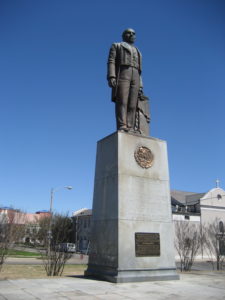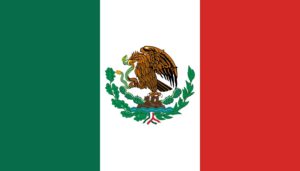The following is a guest post by Ambassador Harold E. Doley, Jr.
Do you celebrate Cinco de Mayo?
And further, do you know why there is a statue of Benito Juarez, the “Father of Mexico” on Basin Street in New Orleans?
Both are related to the Haitian Revolution and Jean-Jacques Dessalines.

Benito Juárez, lived in New Orleans in exile from 1853-55 during the Mexican military dictatorship of Antonio Santa Anna. Juarez would have another brief exile in New Orleans in 1858. While in New Orleans, this trained attorney lived with free people of color of Haitian descent in the French Quarter and rolled cigars during the day and sold them in saloons at night. During this period, he penned his manifesto, “Plan of Ayutla.”
Juárez, along with his immediate Mexican colleagues, were trained in military planning and strategy by the descendants of self-liberated slaves from Haiti who lived in New Orleans.
Saint-Domingue, as it was called, was France’s wealthiest colony; it also had a population in which Blacks outnumbered whites ten-to-one. The Haitian Revolution (1791 to 1803) resulted in the formation of the independent Haitian Republic. These former slaves vanquished not only the French Army but also the English and Spanish in winning their freedom. The Haitian Revolution is the only successful slave revolt in the history of the world!

After the Louisiana Purchase in 1803, some free people of color believed that they would be unable to retain the liberties that they had attained primarily under Spanish Rule. Simply stated, they were suspicious of keeping their freedoms under the United States Government. Therefore, over 100 families moved from Louisiana to Veracruz, Mexico. There these Haitian-Americans befriended attorney Benito Juárez. When Juárez had to flee Mexico because of his revolutionary activities he took refuge in New Orleans with the families of the Haitian-Americans he knew in his home country.
On 17 July 1861, Juárez, then President, issued a moratorium suspending all payments of foreign debt for the next two years. The French under the Emperor Napoleon III responded by attacking Veracruz. On 5 May 1862, the Haitian-trained Mexicans and Haitian-descended New Orleanians, despite being out manned two-to-one, decisively defeated the French invaders.
There are many families today in New Orleans that are descendants of those Haitians who fled to Veracruz. One very prominent name is that of Venerable Henriette de Lille-Sarpy, whose great-nephew migrated to . In 1999, a group from Veracruz visited the Sisters of Holy Family Motherhouse in New Orleans tracing their ancestry.
Having been popularized by alcohol companies as a day of celebration around the United States since the 1980s, Cinco de Mayo is in actuality a crucial link among the histories of Mexico, Haiti, and Louisiana.



Isn’t it amazing, my great-great grandfather was a part of that group with his wife from Spain.
Thank you for this informative and wonderful article. I often wondered why he came to New Orleans.
I remain Culturally Creole
Denise Augustin
Denise, I have a picture of Homer Plessy’s relative who came in 1999 to Saint Augustine’s Church at my Jazz Museum.
Excellent story about the world we share. It’s time to order your Haitian flag to celebrate flag day, May 18, coming up soon.
Excellent and very informative. New Orleanians should know that Haiti is the only country in the Carribean to defeat Spain & England. Thanks Harold
Mary Gehman has written about the “Eureka Colony”, the folks that left New Orleans and went to Vera Cruz during the period of the Civil War.
Michael,
I just this morning
(April 6, 2023) received an email of this article from Judy Geddes Bajoie.
I am aware of Mary Gelman and what I consider her cursory telling of Our story!
This is analogous to comparing a grape to a watermelon!
Harold